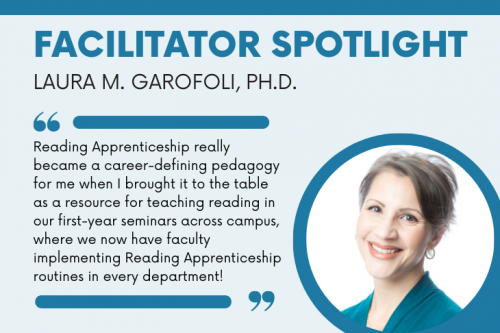Location: Fitchburg State University, Massachusetts
Years of Teaching: 25 years (including K through College)
If you had to describe yourself as an educator, what six words would you use and why?
Caring, accessible, and fair: First and foremost, I care about who my students are as people. I make sure that I am accessible to them both in and out of the classroom so that they have what they need to learn and perform at their best. I am fair and equitable when designing learning opportunities and assessments, and I provide the flexibility that students need to meet their learning targets, even when life throws curveballs their way.
Energetic, enthusiastic, and humorous: Students tell me that my classes are fun and engaging, that they enjoy my use of humor, and they are motivated by the energy that I bring to the learning environment.
What drew you to Reading Apprenticeship?
I first learned about Reading Apprenticeship when I was a reading specialist at a residential school for children with behavioral and mental health disorders. I served students K through12, but we had limited resources for teaching comprehension, particularly for older students. I happened upon the first edition of “Reading for Understanding” and began incorporating Reading Apprenticeship into my practice. Once I transitioned to teaching at the collegiate level, I found that Reading Apprenticeship was still a part of my practice. But Reading Apprenticeship really became a career-defining pedagogy for me when I brought it to the table as a resource for teaching reading in our first-year seminars across campus, where we now have faculty implementing Reading Apprenticeship routines in every department!
What is your go-to Reading Apprenticeship routine?
Think Aloud is my go-to Reading Apprenticeship routine! I use it in every aspect of my teaching, from the classroom to advising. It has become such a part of who I am and how I function on a daily basis that my students have come to understand it as a way of getting the most out of every learning experience by leveraging the skills, strategies, and knowledge of everyone at the table, no matter the task.
Can you share a story about a time when you or a student had an “aha!” moment with Reading Apprenticeship?
While I’ve had many students experience “aha!” moments with Reading Apprenticeship, I think the most powerful moments have been with my campus colleagues. As the coordinator of our first-year seminar program, I am responsible for designing and delivering the faculty professional learning program, which ensures that all first-year seminars across campus target the same three learning outcomes (habits of mind, metacognitive reading, and information literacy). Reading Apprenticeship is the central pedagogical approach that we use to help students meet all three learning outcomes. What has been most impactful for me in this work is seeing my colleagues struggle through some initial discomfort to now implementing Reading Apprenticeship routines in ALL of their classes (not just their first-year seminars)! Some of my most skeptical colleagues have become the greatest champions of and advocates for Reading Apprenticeship on campus, and that has been a true privilege to witness.
If you could describe Reading Apprenticeship in a sentence, what would you say?
Reading Apprenticeship is really thinking apprenticeship – no matter the situation, you can use the routines to read, think, and learn with greater stamina and depth.
What are you reading right now?
“Metabolical: The Lure and the Lies of Processed Food, Nutrition, and Modern Medicine” by Robert H. Lustig, MD, MSL

